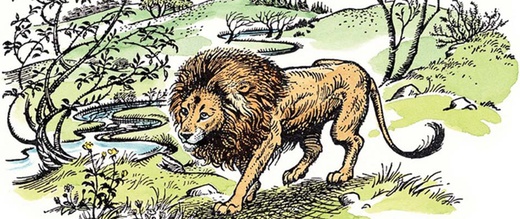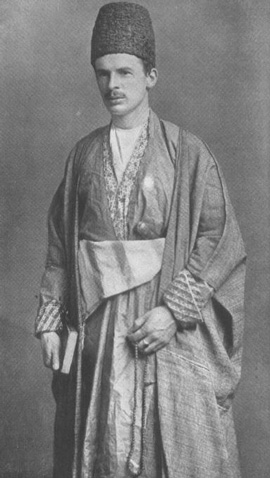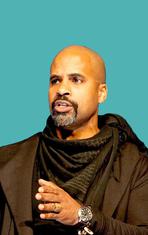The views expressed in our content reflect individual perspectives and do not represent the authoritative views of the Baha'i Faith.
As I re-read C.S. Lewis’ description of the Lion, Aslan, to my young sons, I realized how effectively he described the character not only of Jesus Christ–but, in accordance with my new understanding, the character of all the Manifestations of God, the great Prophets who founded the world’s major Faiths.
In The Chronicles of Narnia, the Lion, I realized, could symbolize all the founders of the world’s historic religions, including and especially Baha’u’llah himself. I felt the resonance as I understood, from an adult perspective this time, how Lewis puts into words the effect the Manifestation of God, or even the name of the Manifestation, has on people.
Let’s look at Lewis’ descriptions of the Lion, Aslan, followed by one famous description of Baha’u’llah by the only Westerner ever to have met him, the British scholar Edward Granville Browne. First, Aslan:
They say Aslan is on the move—perhaps has already landed.
“And now a very curious thing happened. None of the children knew who Aslan was any more than you do; but the moment the Beaver had spoken these words everyone felt quite different. Perhaps it has sometimes happened to you in a dream that someone says something which you don’t understand but in the dream it feels as if it had some enormous meaning—either a terrifying one which turns the whole dream into a nightmare or else a lovely meaning too lovely to put into words, which makes the dream so beautiful that you remember it all your life and are always wishing you could get into that dream again. It was like that now. At the name of Aslan each one of the children felt something jump in his inside…”
In the Chronicles, the Beavers struggle to further explain Aslan’s identity to those who have never heard of him:
“Aslan?” said Mr. Beaver, “Why don’t you know? He’s the King. He’s the Lord of the whole wood, but not often here, you understand. Never in my time or my father’s time. But the word has reached us that he has come back. He is in Narnia at this moment. He’ll settle the White Queen all right. It is he, not you, that will save Mr. Tumnus….”
“Ooh!” said Susan, “I’d thought he was a man. Is he—quite safe? I shall feel rather nervous about meeting a lion.”
“That you will, dearie, and make no mistake,” said Mrs. Beaver, “If there’s anyone who can appear before Aslan without their knees knocking, they’re either braver than most or else just silly.”
“Then he isn’t safe?” said Lucy.
“Safe?” said Mr. Beaver. “Don’t you hear what Mrs. Beaver tells you? Who said anything about safe? Course he isn’t safe. But he’s good. He’s the King, I tell you.”
“I’m longing to see him” said Peter, “even if I do feel frightened when it comes to the point.”
This notion of fierceness and goodness living within the same entity may help us if we struggle with the notion of the “fear of God.”
In Chapter 12, the children meet Aslan for the first time:
But as for Aslan himself, the Beavers and the children didn’t know what to do or say when they saw him. People who have not been in Narnia sometimes think that a thing cannot be good and terrible at the same time. If the children had ever thought so, they were cured of it now. For when they tried to look at Aslan’s face they just caught a glimpse of the golden mane and the great, royal, solemn, overwhelming eyes; and then they found they couldn’t look at him and went all trembly.
And now, E.G. Browne’s famous “pen portrait” of Baha’u’llah. The encounter takes place in Akka, Israel, in 1890, when Baha’u’llah would have been approximately 73 years old:
… my conductor paused for a moment while I removed my shoes. Then, with a quick movement of the hand, he withdrew, and, as I passed, replaced the curtain; and I found myself in a large apartment, along the upper end of which ran a low divan, while on the side opposite to the door were placed two or three chairs. Though I dimly suspected whither I was going and whom I was to behold (for no distinct intimation had been given to me), a second or two elapsed ere, with a throb of wonder and awe, I became definitely conscious that the room was not untenanted. In the corner where the divan met the wall sat a wondrous and venerable figure, crowned with a felt head-dress of the kind called taj by dervishes (but of unusual height and make), round the base of which was wound a small white turban. The face of him on whom I gazed I can never forget, though I cannot describe it. Those piercing eyes seemed to read one’s very soul; power and authority sat on that ample brow; while the deep lines on the forehead and face implied an age which the jet-black hair and beard flowing down in indistinguishable luxuriance almost to the waist seemed to belie. No need to ask in whose presence I stood, as I bowed myself before one who is the object of a devotion and love which kings might envy and emperors sigh for in vain!
Side by side, we can clearly see both of these British authors struggling to find words that convey a majesty and nobility that for which human language, in all its glory, is ultimately inadequate.


















Comments
Sign in or create an account
Continue with Facebookor